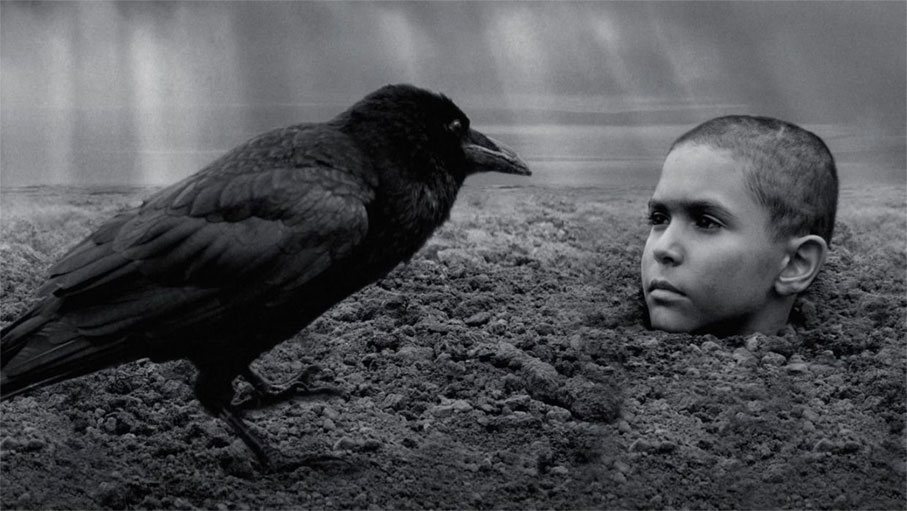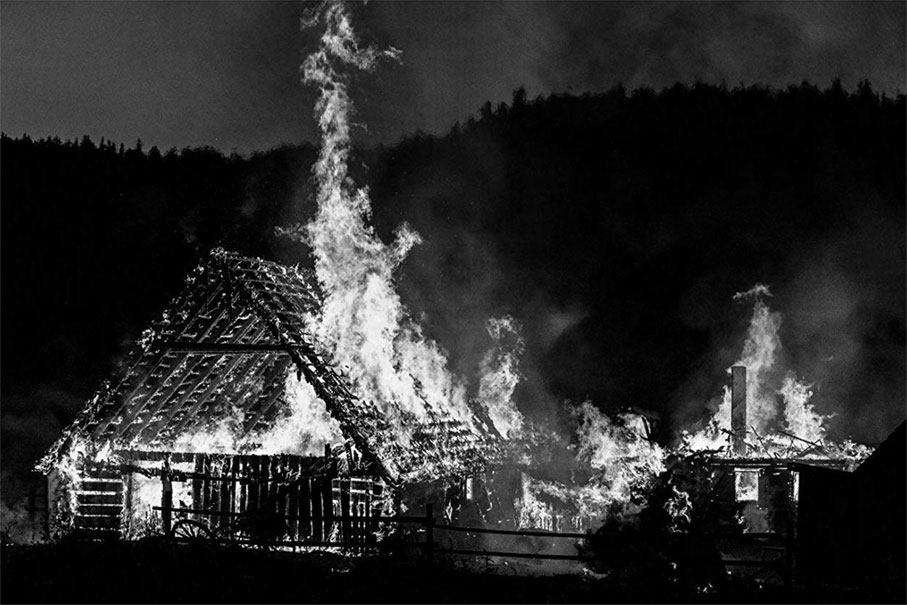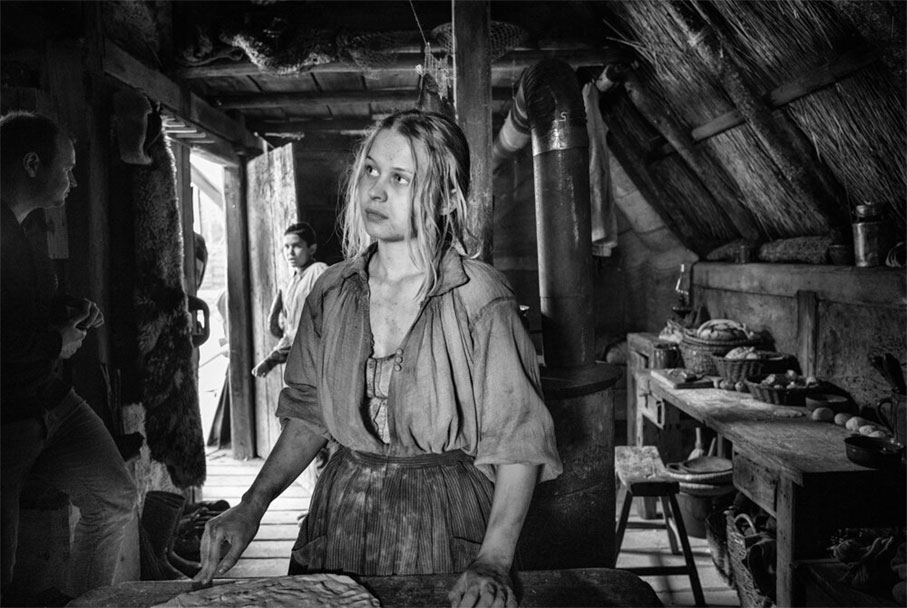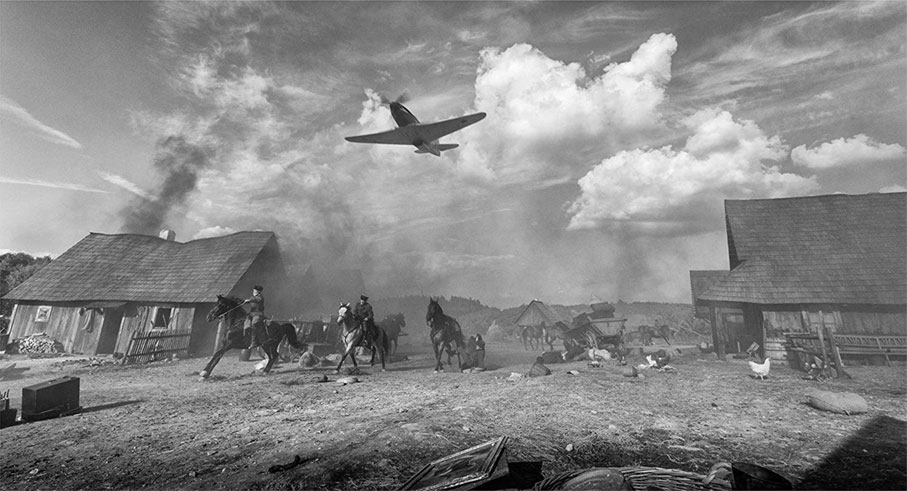|
| |
'We ought to read only the kind of books that wound or stab us. If the book we're reading doesn't wake us up with a blow to the head, what are we reading for? We need books that affect us like a disaster, that grieve us deeply, like the death of someone we loved more than ourselves, like being banished into forests far from everyone, like a suicide. A book must be the axe for the frozen sea within us.' |
| |
Franz Kafka, 1904 |
Epic Hollywood war films like Attack, Battle of the Bulge, The Dirty Dozen, Fury, The Longest Day, The Naked and the Dead, Saving Private Ryan and others too numerous to mention imply that Americans won the Second World War. This is history as written by the victors with the biggest film industry. Few films made outside the former Eastern Bloc have acknowledged the part played by the Soviet Union and Red Army in the Allied victory. Early estimates of Soviet casualties in the war have recently been revised upwards from 20 million to over 40 million. Historians also estimate that Red Army action accounted for up to 80 per cent of the total of German war dead. More Soviet soldiers died just at the Battle of Stalingrad – the turning point in the war – than did Americans throughout the entire period of global conflict. The number of Soviet citizens who died at Stalingrad is incalculable. The heroic efforts of the Americans, ourselves and others in World War II are writ large in the historical record – distortions of which lie heavy on our collective conscience. Václav Marhoul's The Painted Bird focuses on humanity's darkest hour while daring to portray the Red Army in a positive light and hinting at the high cost of war on the Eastern Front. It rescues the citizenry and soldiery of the late USSR from the enormous condescension of history. More importantly and profoundly, it reminds us that the contending human capacities for cruelty and decency – each exponentially intensified by war – are timeless and universal.
Controversy has dogged Marhoul's adaptation of Jerzy Kosiński equally controversial eponymous novel ever since its world premiere. In Venice, it provoked an audience exodus. A more recent screening at the Toronto Film Festival also resulted in a walkout of the fainthearted. I'm delighted to report that nobody left either the press or public screenings I attended during the London Film Festival. On the contrary, those present responded to Marhoul's bleak but beautiful film with riveted attention and, finally, enthusiastic applause. They did so despite, or perhaps partly because of the prurient, sensationalist coverage of it in the gutter press. The Painted Bird looks war and human depravity square in the face, challenging us to face unpleasant aspects of the human condition as sentient adults. It is regrettable that many critics elected to avert their gaze and opted for the aphotheosis of the ostrich. As B.S. Johnson said: 'Down with the partial livers!' Being There isn't enough. Let's live life fully, cognisant of both its darkest corners and sunlit uplands. Let's take a leaft out of the young Franz Kafka's book and rally behind films like Marhoul's that 'affect us like a disaster' and take the axe of cinema to 'the frozen sea within us.'

Three hours long, perfectly paced, exquisitely shot, and immaculately acted by a stellar international cast, The Painted Bird follows a forlorn Jewish boy as he staggers across war-ravaged Eastern Europe in search of an elusive ideal of home. The initially unnamed lad (played with mute, mature grace by Petr Koltar) traverses a region where nothing has changed or much improved for centuries. This is a place of unsullied elemental beauty populated by a wretched, primative peasantry. Early on in the film, a German plane flies overhead, like a surreal detail from Abbas Kiarostami’s reproductions of Hieronymus Bosch in 24 Frames or like an unscripted intrusion onto a set of František Vlácil’s Marketa Lazarová. If the first half of the film, with its meticulous recreation of long-vanished villages and antediluvian custom, owes a clear debt to Vlácil’s historical epic, the second recalls Elem Klimov’s equally devastating Come and See. Films of such coruscating force come along all too rarely; when they do, they make most others seem insignificant and superficial.
Although Klimov and Vlácil paved the way for him, Marhoul has sculpted a hellish, ultimately hopeful masterpiece all his own. From the moment he finished Kosiński's novel in 2006, he was determined to adapt it. Kosiński refused Warren Beatty screen rights and it took Marhoul two years to secure them for himself. In the decade or so between the film's conception and completion, he immersed himself in Kosiński's work in order to replicate the novelist's excoriating vision of humankind gone mad. The Czech director's unwavering commitment and that of his cast and crew alone seem sufficient to repudiate crass accusations of morbidly exploitative amorality. Marhoul clearly shares Kosiński's didactic compulsion to expose the fragility of that trembling veneer of civilisation which separates us from barbarism. His plea for vigilance, aimed squarely at audiences desensitised to violence, itself contains implicit hope and the film ends on a cautiously optimistic note. The limpid grandeur of Vladimír Smutný's black & white 35mm cinematography, with its echoes of Tarkovsky and Tarr, does much to mitigate the atrocities we behold. The elegance of Smutný's deep focus compositions are a perfect match for the elemental splendour of the landscapes they illuminate.
As sad as history and hard as nails, The Painted Bird is divided into nine chapters named after the adults – by turns compassionate and callous, protective and predatory – whom the vulnerable boy encounters. The first of these custodians is an elderly relative, Marta (Nina Sunevic), to whom he's entrusted by his persecuted parents. While in her 'safe keeping' in the country, a group of local lads wrench the boy's beloved ferret from his grasp and promptly burn it alive. As the poor thing squeals and circles in its death throes, the stage is set for worse to come. As the boy buries the remains, he buries his innocence.

Throughout the film, the brutalities suffered by the boy are mirrored in those inflicted on prey as innocent as him. Marhoul follows Kosiński’s novel largely to the letter but subtly amends it to allow for human decency. Those critics who walked out of the film might be surprised to learn that Marhoul’s vision is gentler and more forgiving than Kosiński’s. He pulls no punches but his visceral depictions of human depravity are offset by acts of kindness that feel precisely planned. Close study of the film’s rolling vignettes would, one suspects, reveal a meticulously patterned metaphorical schema that allows for light and shade in human affairs. The intricacies of the film’s narrative are such that any summary of this sprawling epic’s plot must be partial. It is to be hoped, though, that the attempt at precis that follows might, at the least, insinuate a sense of order in the juxtapositions of viciousness and virtue that inform and enhance the whole.
After Marta dies suddenly one night, the boy reels back in horror and accidentally burns her farmhouse down before embarking on his journey into the heart of darkness. Seized soon afterwards by superstitious peasants gripped by blood lust, he is rescued by Olga (Ala Skalova) – a shamanic mystic who instructs him in her ancient healing arts. She saves his life again, after he develops a fever, by burying him to the neck to draw the spirits from his soul; and yet again, by warding off the ravens who subsequently circle to peck at his exposed cranium. Separated from his grizzled saviour after tumbling into a river, the boy washes ashore at a mill. The miller (the steely-eyed Udo Kier) grudgingly tolerates him but regularly beats his wife and, finally, jealously gouges out the eyes of his covetous assistant.
Forced into flight once more, the boy finds shelter with Lekh (Lech Dyblik), a kindly bird-catcher who provides the leitmotif for this cautionary tale when he paints a starling white, releases it, and watches on as it is pecked to death by its own flock. Difference spells danger for the abandoned bird-boy bereft of love and baffled by his kind. The repeated symbolism implicit in cruelty to creatures great and small is compacted with that of sexual dissipation to flesh out Marhoul and Kosiński’s searing indictment of moral collapse and turpitude. Unfortunately, Marhoul accepts Kosiński’s enslavement to the Madonna-whore complex uncritically. Even so, where Kosiński’s lascivious asides famously reflected his own licentious lifestyle, Marhoul’s treatment of debased sexual relations is infused with tear-drenched regret for innocence lost. Can we not rise above the level of rutting beasts, he seems to ask, and try a little tenderness? When Lekh cavorts with his half-crazed lover, Ludmila (Jitka Cvancarová), their carnal union balances lust and love – a fine balance that is evoked again in Lekh’s devasted reaction to her violent murder by enraged local women.

Already the boy has learnt that animal sexual desire can unhinge adults; inevitably, the beatings, torture and rape he endures inures him in the false teachings of adult cruelty. When he finds further refuge with a libidinous farmer's daughter whose unsatisfied desire turns against him, we're as appalled by her cold-hearted rejection of the boy's palpable yearning for affection and tenderness as her recourse to bestiality. In the timeworn tradition of damaged youth, he takes his pain and anger out on the favoured goat. Marhoul spares us nothing. Having slammed the door to this latest refuge firmly shut, the boy struggles gamely on and stumbles upon a wounded horse. Taking pity on the quadruped, he leads it on to a village – for help but, unwittingly, to its death.
At this point the film swivels on its axis and war bursts into its flame-dark frames in the shape of brutish partisans. They force-feed the boy vodka before turning him over to Nazis for sport. A Wehrmacht soldier, Hans (Stellan Skarsgård), takes pity on him and volunteers for execution duties in order to save his life. The ensuing scene of barbarism, in which he witnesses Jewish prisoners escape from their cattle trucks only to be mown down in cold blood, is devoid of pity. In the despicable dog-eat-dog pillage that follows, first the local peasants and then the debased boy himself loot the corpses.
Captured by the SS, along with a Jewish man who spits defiance at such 'scum', the boy successfully grovels for his life. He is turned over to a well-intentioned priest (Harvey Keitel). Here Marhoul departs from the source novel and draws on Kosiński's life. Although the novelist allowed the legend to develop that his blistering book was autobiographical, he was sheltered during the war by Catholics and became an altar boy at their behest. The film's young protagonist, too, dons the cassock to survive but his abnegation only adds to his stock of suffering. The criminally naïve priest entrusts the boy to a repellant paedophile, Garbo (Julian Sands), who rapes and tortures him repeatedly until the boy lures him to a death too blood-curdingly gruesome to either forget or describe.
After returning, in his desperation, to the church he drops the holy book during a service and is tossed into latrine of excrement as punishment. The next village in his odyssey is attacked by maruading Kalmuck Cossacks in the pay of the Nazis, who in turn are driven off by the advancing Red Army. It is the ranks of the Red Army that the boy finally finds the role models and father figures he’s craved, men of committed compassion with his best interests at heart. Terrified, schooled by grim experience to be wary, the soul-dead boy flinches fearfully when confronted by unexpected decency.

Here, Marhoul tips his hat not only to the Red Army but also to Klimov’s Come and See by introducing us to Gavrila – played by Alexsey Kravchenko, who played the boy, Florya, in Klimov’s masterpiece. Deluded Stalinist though Gavrila is, hardened by and for war though he is, this 'good Communist’ shows the boy genuine tenderness. He implicitly appeals to the boy’s damaged sense of trust and invites him into his tent to meet his comrade-in-arms, the noble sniper Mitka (Barry Pepper). The boy fears the worst and so do we. For once in the film, our fears are unjustified. The world-weary combatants take the boy under their wing in moving, unspoken solidarity. After four men from their unit are slaughtered by the local peasantry, Mitka teaches the boy another (false) lesson, 'an eye for an eye’, as he skilfully picks off four hostile villagers in retribution.
As the film nears its harrowing, hopeful climax Gavrila, Mitka and the Red Army leave on their push to Berlin and the belly of the beast and the boy is sent to an orphanage. His innocence reawakened, he is violently assaulted, one last time, by a swivel-eyed anti-Semite as he stands, in a reverie, admiring a toy horse fraught with symbolic meaning. The film’s enigmatic finale must remain a mystery but we sense hope for the boy and the future. As the credit’s roll, we also hope and yearn for more from Václav Marhou, Vladimír Smutný, editor Ludek Hudec, costume designer Helena Rovna, and all the outstanding actors who collectively enabled The Painted Bird to take its place among the finest achievements of contemporary cinema. How such a brave, deep-dark film will fare in an anxious and hostile world remains to be seen. The partial livers, with their plastic smiles and reductive worldviews, will continue to recoil from the film’s unrelenting honesty. Hopefully, it will reach others able to appreciate Marhoul’s nuanced treatment of subjects all too often elided. Hopefully, it will reach intelligent adult audiences and be watched for years to come.
|